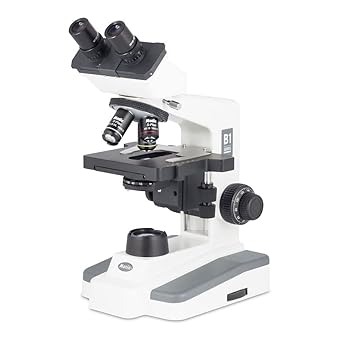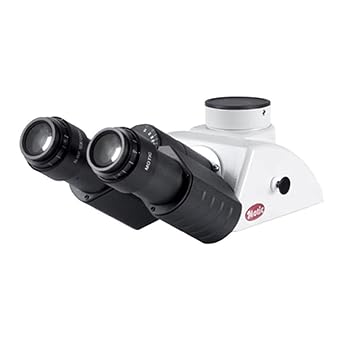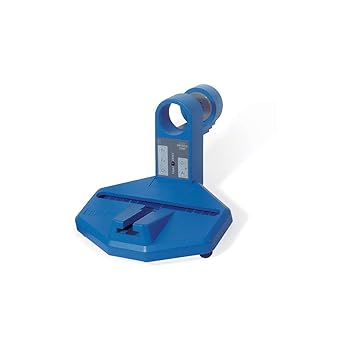
1100100500333 Series B1-223 ASC Trinocular Compound Microscope, WF10x Eyepieces, ASC High-Contrast Objectives, 40x-1000x Magnification, Brightfield, Halogen Illumination, Abbe Condenser with Iris Diaphragm, Mechanical Stage, 110V
Brand: Motic
Out of stock
- Compound microscope provides high magnification for biological use and educational applications
- Trinocular viewing configuration with a sliding binocular head that has a pair of 20mm 10x widefield eyepieces and fixed inclination to reduce eye and neck strain, and a trinocular port that accepts a camera adapter (sold separately)
- Forward-facing nosepiece with 4x, 10x, 40xS, and 100xS (oil) DIN ASC high-contrast objectives that provide sharp color distinction and keep the image centered and focused when magnification is changed
- Brightfield, halogen illumination with rheostat and rack-and-pinion 1.25 NA Abbe condenser with iris diaphragm for clear examination and light control
- Mechanical stage locks slide into place and provides precise slide manipulation along the X- and Y-axes, and coaxial nested coarse and fine focus knobs speed focusing
Description
The Motic 1100100500333 Series B1-223 ASC Trinocular Compound Microscope has a pair of 10x widefield eyepieces, a trinocular port, a forward-facing nosepiece with four high-contrast objectives, halogen illumination, coaxial nested coarse and fine focus, 1.25 NA Abbe condenser with iris diaphragm, and a mechanical stage. The trinocular viewing head has a binocular head with a pair of eyepieces that slide to adjust interpupillary distance, a fixed inclination to reduce eye and neck strain, and 360-degree rotation capability to provide a more comprehensive view and enable sharing; and a trinocular port that accepts a camera adapter (sold separately). A forward-facing nosepiece eases changing objectives. ASC (achromatic super contrast) high-contrast objectives provide sharp color distinction. The 40xS and 100xS objectives are retractable and spring-loaded to prevent damage to the slide or objective when focusing. The 100xS objective is also an oil objective that provides increased resolution over a standard objective. A compound microscope is used for inspection and dissection of specimens when two-dimensional images are desired. The microscope has lower (diascopic) brightfield illumination that transmits light up through the specimen for enhanced visibility of translucent and transparent objects. Brightfield (BF) illumination allows the specimen to absorb light, resulting in a dark image on a light background. The halogen light source provides bright light in a concentrated path, and a rheostat controls the amount of light emanating from the lamp. The Abbe condenser can be adjusted to control the distance of the light from the stage and has an iris diaphragm to optimize the amount of light illuminating the specimen. The condenser is controlled using a rack-and-pinion mechanism. Blue, green, and yellow filters are included to modify the light to suit various specimens. The mechanical stage locks the slide into place and provides precise slide manipulation along the X- and Y-axes. Coaxial coarse and fine focus knobs are nested to speed focusing for left-and right-handed viewers, and tension adjustment ensures specimen stays focused during viewing. Microscope Head and Optics SpecificationsHeadTrinocular, slidingMagnification range40x-1000xLight split100:0/20:80Binocular head inclination30 degreesInterpupillary adjustment55 to 75mmEyepieces (20mm)WF10xNosepieceQuadruple, forward-facingObjectives, DIN ASC high-contrast4x, 10x, 40xS, 100xS (oil) Microscope Illumination and Stage SpecificationsFocus typeCoaxial coarse and fineCondenser1.25 NA AbbeLight sourceHalogen with rheostat, 12V/20WDiaphragmIrisIllumination typeBrightfieldStage typeMechanicalStage dimensions140 x 135mm (W x D)Stage travel range78 x 50mm (X-direction x Y-direction)Power110V W is width, the horizontal distance from left to right; D is depth, the horizontal distance from front to back. Microscopes are instruments used to enhance the resolution of an object or image. Types include compound, stereo, or digital. Compound microscopes use a compound optical system with an objective lens and an eyepiece. Stereo microscopes show object depth in a three-dimensional image. Digital microscopes are used to display an image on a monitor, rather than looking through a lens. Microscopes can have monocular (one), binocular (two), or trinocular (three) eyepieces, with varying magnification abilities. Magnification ability refers to the size of an image. Resolution, also known as resolvant power, refers to the clarity of the image. The interaction between field of view (FOV), numerical aperture (NA), and working distance (WD) determines resolution. Microscopes can control magnification through a fixed focus, or through a range of adjustments. They can also utilize LED, fluorescent, and mirror light sources to help control viewing capabilities. Microscopes are widely used in education, lab research, biology, metallurgy, engineering, chemistry, manufacturing, and in the medical, forensic science, and veterinary industries. Motic manufactures microscopes, microscope cameras, digital imaging products, and application software. The company, founded in 1988 and headquartered in Xiamen, China, is a subsidiary of Hong Kong-based Speed Fair Co. Ltd. and meets International Organization for Standardization (ISO) standards 9001 and 14000. What's in the Box? Motic 1100100500333 Series B1-223 ASC Trinocular Compound Microscope (2) WF10x eyepieces, 20mm 4x DIN ASC high-contrast objective 10x DIN ASC high-contrast objective 40xS DIN ASC high-contrast objective 100xS (oil) DIN ASC high-contrast objective Blue filter Yellow filter Green filter Immersion oil Dust cover
Product Details
| Package Dimensions ? | ? 23.75 x 16.8 x 10.9 inches; 0.71 ounces |
| Item model number ? | ? 1100100500333 |
| Date First Available ? | ? March 27, 2013 |
| Manufacturer ? | ? Motic Instruments |
| ASIN ? | ? B00C2FFEVQ |
| Country of Origin ? | ? China |






